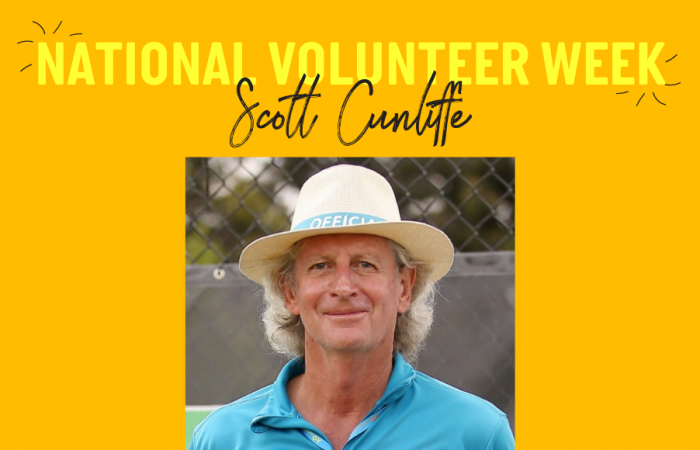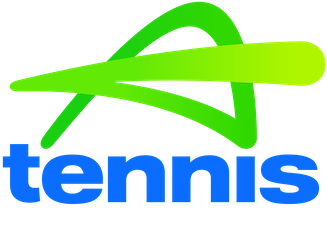21 May 2022 | Tennis Queensland

This week is National Volunteer Week and to celebrate we wanted to recognise some of the awesome volunteers across our state who give so much to the tennis community. One of these volunteers is Scott Cunliffe from Cairns in Far North Queensland. Scott is part of the officiating family and is constantly supporting local events through officiating. He is also a part of the national referee program and through his line umpire role was able to head to Victoria over the summer and be a part of the Australian Open team. Highlighting the incredible pathway opportunities from volunteer roles to Grand Slams.
We had a chat to Scott to hear more about his volunteering & officiating journey, check it out below!
How did you get involved in volunteering & officiating?
“My officiating journey started in 1982 when I was in Canada doing a Master’s degree. I needed a summer job and was approached by Alberta Recreation to run kids tennis camps and tournaments, which involved parts of officiating. This was a paid role but it equipped me with skills that I have been able to take into the second part of my volunteer officiating journey.
When I came back to Australia in 2016, I was coaching in Darwin at Garden’s tennis. As a tennis coach, I felt a strong desire to volunteer and get involved further in the sport. Through Gary Bigg (a line umpire and referee in the Northern Territory), I recognised there was opportunities as an official to continue educating kids on their tennis journey. As a coach you are able to watch the development of a player with training, but through officiating you are able to educate them on the rules and etiquette of tennis which enables them to become a better competitor.
Since returning to Australia, I have completed the court supervisor and line supervisor course.
In recent years, I have been volunteering at tennis tournaments across North Queensland and this year was fortunate to get a taste of where the officiating pathway can take you. Grand Slams are the pinnacle of our sport and as a kid I went to the Australian Open (back when it was at Kooyong) every year with my father as a spectator. This year I had the opportunity to go as an official and it was an amazing experience.”
What is your favorite thing about being an official?
“This is probably because of my coaching background, but for me, my favourite thing is seeing the penny drop for a child on a particular rule or aspect of tennis. When they realise that they need to hit the ball before the second bounce and then you see them adapt and change their game – lesson learnt – onto the next thing.
Having the opportunity to give children a learning experience is most satisfying and it’s pretty special to be able to play a role in the tennis journeys of others.
I remembered whilst officiating at an Orange Ball tournament in Darwin, I took a young child aside who did not understand how to score, and we spoke through it and he finally got it. After our conversation, I saw him go back on court and play with confidence, knowing how the scoring worked. I thought it was a pretty small thing, but from a coaching perspective it changed his confidence and approach to the match and he went on to win the tournament. I’ll never forget it. He was so happy and he came up to me after and said, Mr Scott, thank you for helping me.”
Why should others get involved?
“We all tend to take for granted that certain things just occur, an example of this is when you head to a tournament you assume that officials will be there. Without officials, there is no game and we really need more officials to help contribute to the development of our sport through educating both players and parents.
I have a long-standing passion and love of tennis and I want to help others understand and love the game as much as I do. At the end of the day, it is a satisfying thing to give back to a sport that has given me so much.”
Interested in becoming an official like Scott? Find out more below!
The Community Officiating Program is a starting point for anyone to become an official.
The program has two components as part of the official training.
- Online Theory
- Four online modules (complete at your own pace)
- Practical
- Once the online theory modules are complete and approved by Tennis Australia, participants will be introduced to a state officiating contact who will connect you with a local event to complete the practical.

